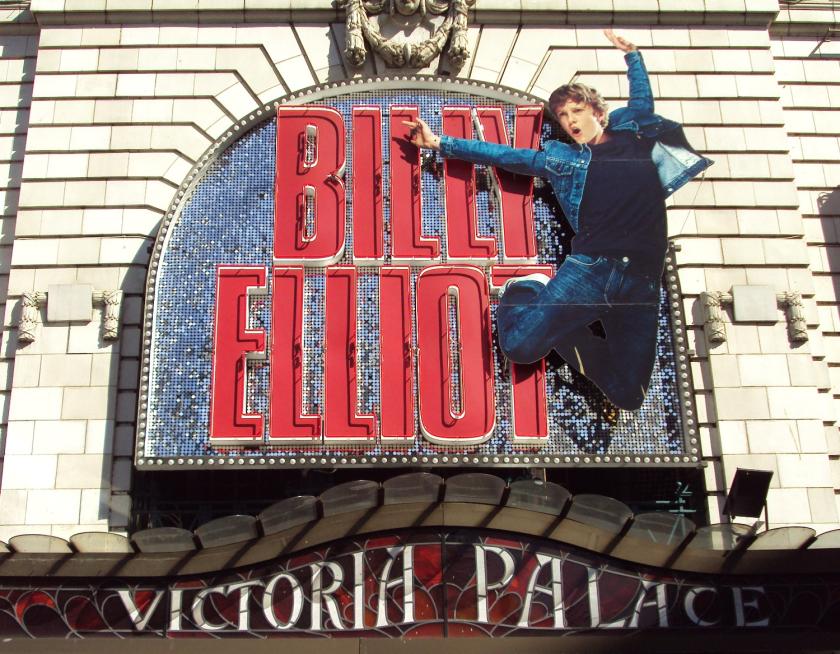As the series ended, it remained at great pains to repeatedly point out that this was the story of the British musical, its post-War success and how Oliver and Jesus Christ Superstar conquered Broadway. Yet it was hard not to sigh as episode three finished with Disney and Sir Cameron Mackintosh cosying up to stage Mary Poppins, which Mackintosh had the rights to. Universal hit Britain’s stages with Wicked, as DreamWorks has with Shrek The Musical. The story of the British musical concluded with corporate America moving in.
It’s not hard to see the interest - British musicals are worth £1.5 billion pounds a year. During the era in which this three-part series began, in the aftermath of World War II, nobody could have predicted such a figure. The musical London Town (not mentioned in the series) was, in 1946, the biggest budget British film to date. It flopped and failed to inspire anyone or anything (see a clip below). London’s stages showcased American imports.
The first episode of The Story of Musicals hurtled through the successful The Boyfriend and its Broadway failure, the influence of Joan Littlewood and Lionel Bart’s rise and fall. It finished with the entrance of Tim Rice, Andrew Lloyd Webber and Jesus Christ Superstar. Episode two continued with Evita, the seduction of America, Cats, Les Misérables, Blood Brothers, Phantom of the Opera, largely underpinned by the savvy of Mackintosh.
Miss Saigon's Broadway run was almost pulled after the American actor’s union complained
Up to this point, the narrative arc was dominated by a rush forward: creatively, in scale and in levels of success. But with last night's episode and the dawn of the Nineties the shift towards musicals featuring celebrities began, no matter how ill-fitting the big name. Lloyd Webber’s more reflective Aspects of Love was meant to star Roger Moore, but he dropped out before the show opened. Michael Ball stepped up and has never looked back. However, it was a relative damp squib on transferring to Broadway.
Mackintosh still had faith in the idea that actors could do the business and brought Jonathan Pryce into Miss Saigon. Its Broadway run was almost pulled after the American actor’s union complained that Pryce's role should be played by an Asian. Placards wielded by pavement-stomping protestors were to no avail as Mackintosh said he would cancel the show if Pryce wasn’t in it. The union caved in as so much money and so many jobs would have been lost. Miss Saigon was the last massive British export.
So Jesus Christ Superstar, with a Neighbours-fresh Jason Donovan as Joseph, was revived. At least he could sing the role. Faye Dunaway was cast in Sunset Boulevard and ended up suing Lloyd Webber, maintaining that he’d been aware of the register she could sing in, and that he'd written lines he knew she couldn't deliver.
We were in the countdown to Lord Lloyd Webber’s unedifying TV talent show search for a lead for The Sound of Music
Still, at least he’d written them. After a brief huzza for the ludicrous Cliff Richard vehicle Time, with its hologram Lord Olivier, it was time for the arrival of the jukebox musical. Husky-voiced Judy Craymer explained how she'd had the idea for an Abba musical. “Old songs, new story”, as it was put. As the poster child for the jukebox musical, Mamma Mia! has inspired endless followers, including We Will Rock You, hung around the songs of Queen. Whatever the merits of Queen’s music and the joy the show has brought audiences, watching writer Ben Elton describe its risible plot with a poker face was pretty funny.
A couple of musicals were more individual – Billy Elliot and Jerry Springer the Opera – but we were in the countdown to The Lion King and the arrival of the US studio-driven, musical and the unedifying spectacle of Lloyd Webber’s TV talent show search for a lead for his production of The Sound of Music.
Television tie-ins, celebrity stars, shows built around familiar songs and films. Domination by American production giants. If this is where the British musical is today, then it’s become just another cog in the corporate entertainment wheel.
Watch a clip from London Town, the 1946 film which didn’t inspire Britain to create its own musicals















Add comment